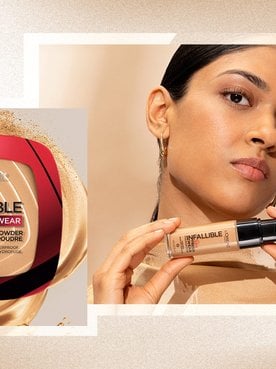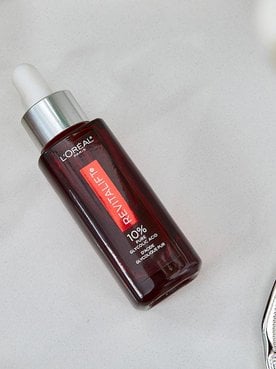Niacinamide has quickly become one of the most talked-about skincare ingredients, showing up in everything from brightening serums to gentle moisturizers. Loved for its versatility, this form of vitamin B3 is known to help smooth texture, even tone, and strengthen the skin’s natural barrier. But if you have blemish-prone skin, you might be wondering: is niacinamide good for acne, or could it actually make breakouts worse?
While not a standalone treatment, niacinamide can help improve the look of acne in many individuals. Using topical niacinamide for acne can help calm redness, balance excess oil, and minimize the appearance of post-breakout marks—all without the drying effects of some traditional acne treatments. In other words, it’s a gentle yet effective option for keeping skin looking clear, calm, and balanced. Ahead, we’ll review some of the most notable niacinamide benefits for acne-prone skin, plus share tips on incorporating this multitasker into your daily routine.
Shop the Products
What Is Niacinamide?
Niacinamide, also known as nicotinamide, is a water-soluble form of vitamin B3 used widely in skincare. Its list of potential benefits is long: per the Cleveland Clinic, niacinamide can help strengthen the skin barrier, boost hydration, and reduce the look of fine lines and wrinkles. It can also help calm the skin, reduce redness, regulate sebum (oil) production, and improve skin texture and tone, making it particularly useful for those with textured or blemish-prone skin.
You can find niacinamide in everything from face washes and masks to serums and creams, so it’s easy to work into your routine. And, as the Cleveland Clinic notes, it tends to be suitable for all skin types, though it’s always a good idea to start with products that contain a lower concentration of the ingredient, particularly if you have sensitive skin.
Does Niacinamide Help With Acne?
When used topically, niacinamide can help manage acne and related concerns, such as redness, clogged pores, and shine. Here’s how:
- Reduces redness: According to the Cleveland Clinic, products containing niacinamide can help reduce redness and irritation associated with skin concerns like acne and eczema.
- Regulates oil production: A review of studies published in the medical journal Antioxidants confirmed that topical niacinamide can help reduce the production of sebum, your skin’s natural oil. This, in turn, can help prevent clogged pores and support a clearer-looking and balanced complexion.
- Boosts skin hydration: It may seem counterintuitive, but dehydration and acne are closely linked. When your skin becomes dehydrated, your body often produces more oil to compensate for the lack of moisture, which can clog pores and lead to breakouts. Niacinamide can help prevent this by keeping the skin hydrated, which may, in turn, help control breakouts.
- Can help calm inflammation: As noted by the Cleveland Clinic, some products with niacinamide can help reduce inflammation, thereby improving the look of inflammatory breakouts.
It’s worth noting that niacinamide alone is unlikely to clear stubborn or persistent breakouts. However, since it’s so gentle, it tends to pair well with other ingredients that benefit acne-prone skin, such as salicylic acid and retinol. Still, it’s best to take caution when layering skincare products—always patch-test new products before applying them to your entire face and consult your dermatologist if you’re unsure how to layer your skincare products safely.
Is Niacinamide Good for Blackheads?
Angry red pimples aren’t the only type of blemish niacinamide can help target—it’s also useful for those who frequently struggle with blackheads. As some background, blackheads develop when a pore becomes clogged with oil, dead skin, and other debris. Contrary to popular belief, the black color of a blackhead isn’t dirt—it’s just the color that oil turns after exposure to the air.
By helping to regulate oil production, products with niacinamide may help reduce the likelihood of developing. Additionally, niacinamide can help hydrate and plump the skin, which may make large pores less noticeable. Keep in mind, though, that you won’t see results overnight—skincare takes time to work. If you have existing blackheads, consult your dermatologist. They may recommend gentle exfoliation to help unclog the pore or provide an in-office extraction to remove the blackhead safely.
How To Use Niacinamide for Acne-Prone Skin
There are many ways that you can use niacinamide for skin concerns—as we mentioned earlier, many products, from serums to sunscreens, contain the multitasking ingredient. Here are a few of our favorite ways to incorporate niacinamide into an acne-safe skincare routine.
1. Use a gentle tone
Toners are liquid skincare products applied to the face after cleansing to help prepare your skin for the rest of your routine. There are countless different types of toners on the market, but niacinamide toners can be great for those with blemish-prone skin. To get the best results, look for a gentle, non-comedogenic formula with a low percentage of niacinamide (5% or less is usually ideal). Pat it onto your face after cleansing to help soothe your skin and lock in moisture.
2. Try a niacinamide serum
There’s a serum for just about every skin type and concern—from dryness to fine lines—but if you’re prone to breakouts, a lightweight, water-based formula with niacinamide is a great place to start. We love the L’Oréal Paris Bright Reveal 12% [Niacinamide + Amino Sulfonic + Ferulic Acid] Dark Spot Serum, which absorbs quickly without feeling greasy. It provides gentle daily exfoliation to help brighten, smooth, and even out the look of skin over time, making it especially useful for anyone dealing with uneven tone or post-acne marks.

3. Reach for a niacinamide-infused moisturizer
Moisturizing daily is a must for every skin type, even acne-prone skin. To help keep your skin feeling balanced and clear, reach for a lightweight moisturizer made with niacinamide, like the L’Oréal Paris Bright Reveal Vitamin C Glow Moisturizer. It’s made with niacinamide, ceramides, and (of course) vitamin C and provides up to 72 hours of hydration without clogging pores. With regular use, you’ll notice your skin looks brighter and more even, and dark spots appear less noticeable.

4. Try a niacinamide and retinol night cream
Niacinamide and retinol play nicely together, so at night, consider using a product that features both, like the L’Oreal Paris RevitaLift Pressed Night Moisturizer with Retinol + Niacinamide. This lightweight moisturizer visibly brightens and helps create an even-looking tone and texture while also combating common signs of aging, such as fine lines and wrinkles. The formula, which features a 12% complex of soothing ingredients, also helps balance the potentially drying effects of retinol. Note that retinol can increase your skin’s sensitivity to the sun, so you’ll want to be diligent about applying sunscreen during daylight hours.
5. Use a niacinamide spot treatment
Spot treatments are ultra-concentrated formulas designed for use only on problem areas, such as individual dark spots or pimples. Different formulas have different instructions for use, but generally, you’ll want to apply a thin layer of your spot treatment directly to the problem area once daily. If you’re using an acne spot treatment, you can usually see results in as little as a couple of days. For post-acne marks, you’ll need to be patient—these stubborn dark spots can take months to fade completely.

Shop the Products
Does Niacinamide Help With Acne Scars?
To answer this question properly, it’s important to understand the difference between true acne scars and acne marks (post-inflammatory hyperpigmentation, or PIH). Though the terms are often used interchangeably, they’re not the same thing. Ahead, we’re breaking down the differences.
Acne scars
According to the Cleveland Clinic, acne scars are physical marks that form when inflamed blemishes damage the skin, often resulting in small indentations (commonly called pockmarks) or raised bumps. Using niacinamide for acne scars is unlikely to significantly change the appearance of these deeper textural scars, as they’re difficult to treat with skincare products alone. That doesn’t mean you’re out of options, though: there are plenty of professional treatments, such as laser resurfacing and chemical peels, that can help smooth the skin and diminish the appearance of acne scars. To determine the best approach for your skin’s needs, it’s best to consult a dermatologist.
Post-acne marks
While niacinamide alone may not nix acne scars, you can use niacinamide for acne-related dark spots, according to the Cleveland Clinic. These are the stubborn red and brown marks left behind long after the pimple or blemish itself has gone away—sometimes for weeks or even months.
In clinical studies, our abovementioned Bright Reveal 12% [Niacinamide + Amino Sulfonic + Ferulic Acid] Dark Spot Serum has been shown to visibly reduce the appearance of post-acne dark spots in as little as one week. You can also try combining exfoliants for more rapid results. Instead of cocktailing your skincare ingredients yourself (which can be risky), look for a formula made with several skin-brightening ingredients, like our L’Oréal Paris Bright Reveal Dark Spot Peel. The powerful at-home peel boasts a blend of AHAs, BHAs, and PHAs—plus niacinamide—and helps brighten the skin in as little as 15-minute application. With regular use, you’ll notice a dramatic improvement in the look of dark spots, including stubborn post-acne marks. Note that this peel isn’t for daily use—we suggest reaching for it no more than four times per week (at night) for the best results.

Can Niacinamide Cause Acne?
Niacinamide on its own shouldn’t cause acne. That said, some people notice new pimples or irritation for a short time after adding it to their routine, and there are a few reasons why that might happen. Sometimes, the issue isn’t the niacinamide itself but how it’s introduced. According to the American Academy of Dermatology (AAD), acne treatments generally take four to six weeks to start showing results, with more noticeable clearing after about two to three months. It’s important to give your skin that adjustment period—switching products too quickly can lead to extra irritation and make things worse.
In other cases, what seems like a breakout could actually be skin purging, a temporary phase where existing clogs come to the surface faster as your skin acclimates to an active ingredient. Purging usually resolves within a few weeks as your skin adjusts to your new routine. And of course, the formula itself can play a role: products that include fragrance, heavy oils, or other comedogenic ingredients may clog pores or trigger sensitivity in some skin types.
If you think your niacinamide product might be contributing to breakouts, try simplifying your routine. Stop introducing new products, and patch test your serum or moisturizer on a small area for a week or two to see how your skin responds. If irritation worsens, discontinue use and check in with a dermatologist—they can help pinpoint what’s going on and recommend the best next steps for your skin.
Niacinamide and Acne FAQs
Can I use niacinamide while pregnant?
Yes, niacinamide is generally considered safe to use during pregnancy. It’s a form of vitamin B3 that works topically to support the skin barrier and doesn’t have known risks when applied to the skin. However, it’s always best to confirm with your healthcare provider before starting any new skincare ingredient during pregnancy.
Does niacinamide help with redness?
Yes, niacinamide can help reduce visible redness by supporting the skin’s barrier and helping it retain moisture more effectively. A stronger barrier means less irritation and sensitivity over time. Many people with mild redness or reactive skin find that niacinamide helps their complexion appear calmer and more even.
Can you use niacinamide with retinol/salicylic acide?
Niacinamide can usually be safely used with retinol, salicylic acid, and benzoyl peroxide. It’s a gentle, balancing ingredient that can actually help reduce the dryness or irritation sometimes caused by stronger actives. To avoid overloading your skin, start slowly and introduce new products one at a time. If you’re ever unsure whether it’s okay to use two skincare products (or ingredients) in the same routine, consult your dermatologist.
How long does it take for niacinamide to work for acne?
Generally speaking, niacinamide can start improving acne and overall skin texture within eight to 12 weeks of consistent use. However, it depends on the type of product you’re using, your skin concerns, and what other products you’re using. For the best results, stick with your routine and avoid switching products too quickly to give it time to work.
What strength of niacinamide is best for breakouts?
A concentration of around 5% niacinamide is typically effective for managing breakouts and excess oil. Higher strengths may offer faster visible results, but can sometimes cause irritation or sensitivity. To keep your skin comfortable and balanced, start with a lower concentration and increase as your skin tolerates it.
Can niacinamide be used on sensitive skin?
Yes, niacinamide is generally well-tolerated and suitable for sensitive skin. It helps reinforce the skin’s moisture barrier, which can reduce dryness and irritation over time. In rare cases, it may cause temporary redness or discomfort. If you’re introducing it for the first time, patch test and start with a lower concentration to ensure your skin adjusts comfortably.
Next Up: 5 Glycolic Acid Benefits for Skin That Might Surprise You
Photo courtesy of L’Oréal Paris







